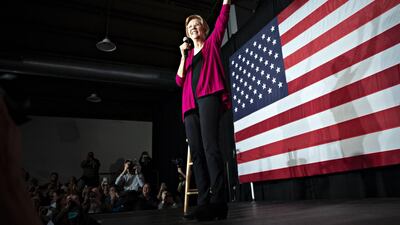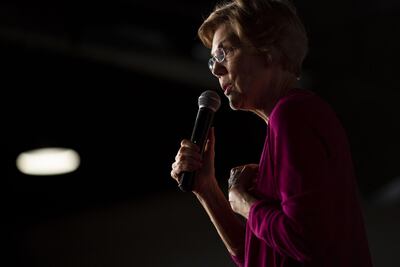The starting gun for the 2020 US presidential election has been fired. Elizabeth Warren, a senator from Massachusetts, became the first Democrat to take an official step to bid for the White House by forming an exploratory committee for the presidential campaign. Since she made that move, there has been much talk of her "likeability" – a word that came to haunt Hillary Clinton's campaign and ultimately proved her downfall.
There is little doubt, however, that Mrs Warren would make a progressive president. She has talked movingly about poverty and the hollowing-out of America's middle class. She has taken on the banks that caused the financial crisis. And she has railed against “rigged rules” that don't apply to the rich and powerful. If she makes it to the White House, she would be America's first female president and, based on her current speeches, one of the more liberal holders of the office.
There's only one problem. She cannot beat Donald Trump.
Look again at the themes she has talked about and they are curiously similar to the ones Bernie Sanders expounded during his failed attempt to win the Democratic nomination in 2016. That is one of the reasons why Democrats are excited by Mrs Warren; she seems a more polished, equally liberal version of the rather rumpled Mr Sanders – someone who could combine his principles with the poise of Mrs Clinton.
But while that might win over traditional Democrats, it leaves a question mark over more right-leaning voters. For the Democratic party appears convinced that tacking further to the left, paralleling the Republican shift to the right, will bring them victory. However, comprehensively winning the next election will mean fighting from the centre, reaching both those in work and feeling squeezed, and those out of work and feeling resentful.
A key criticism of Mrs Clinton was that she was too much of an insider, defending a broken system while Mr Trump posed as someone who could make it better, even if his ideas were vague and ill-defined. (“We’re going to win so much, you’re going to be so sick and tired of winning,” he famously told a campaign rally in Montana in 2016.) By contrast, Mrs Clinton represented the establishment at a moment when voters were tired of it. But the establishment and the centre-ground need not be synonymous; Barack Obama, an outsider candidate who governed from the centre, proved that.
A candidate who focuses on the injustices of the current system but also explains how that system, once fixed, might create a growing economy, could be compelling. A candidate who wants to target big businesses, but only so as to level the playing field for smaller businesses, could resonate; an anti-establishment candidate, in other words, who could reach beyond the narrow Democratic heartland.
Mr Trump, for all his outsider schtick, understood this; wrapped within the anger and vitriol of his campaign were messages that traditional working-class Democrat supporters could believe. Recall that, out of more than 650 US counties that twice voted for Mr Obama, one third swung to Mr Trump. Mrs Clinton, by contrast, only took six counties nationwide that were previously Republican.
Mr Trump's next opponent will have to find ways to take votes from the Republicans while also withstanding his attacks.
There, Mrs Warren is exposed in similar ways to Mrs Clinton. She has shown herself to be too easily drawn into Mr Trump's taunts, naively accepting his challenge to take a DNA test to prove her Native American heritage. She has also demonstrated Mrs Clinton's leaden pose as a woman-of-the-people, broadcasting a widely mocked video from her kitchen on New Year's Eve where she “suddenly” felt like drinking a beer and awkwardly declared her affection for her husband. As a wealthy ex-Harvard professor from a liberal state, she is susceptible to the charge of being out of touch.
But she is also exposed in ways Mrs Clinton was not. It will be too easy to dismiss her as a socialist and weak on defence, two blistering criticisms in the US.
However, the one aspect of Mrs Warren's candidacy that I'm not convinced is an issue is the one that the US media have focused on relentlessly: her gender.
US media have reported on the agonies within the Democrat establishment over whether a female candidate could actually beat Mr Trump. "There's a fear that if misogyny beat [Mrs] Clinton, it can beat other women," a former Democrat adviser told the New York Times.
There is a widely held assumption that Mrs Clinton’s gender was one critical reason for her failure. While it does appear that parts of the US public are more willing to accept a minority president than a female one, that should not be a significant part of the calculation when considering how to beat Mr Trump.
The sexism in the system is not Mr Trump's creation; he doesn't even exploit it that well. The focus on a female candidate's “likeability” or “toughness” pre-dates Mr Trump. In any case, his sexist attacks are rather crude and the media have been good at calling them out. They might even galvanise his opponents.
All of which means that while a female candidate is going to have a tough time against Mr Trump, so would an inexperienced candidate – as Mr Obama was – or a candidate with any attributes that Mr Trump could mock. The dispenser-in-chief of insults will work with whatever he can.
Instead of worrying about that, Democrats should look at Mr Trump with fresh eyes and recognise that his powerful combination of showmanship, incumbency and a rising economy will make him hard to beat in 2020.
To do so, the Democrats will need to offer something fresh to the American people – not another version of Mrs Clinton or Mr Sanders but someone whose charisma, gravitas, approachability or intellect gives them a star quality of their own to rival Mr Trump's.
No such candidate currently exists but the Democratic contest is the time for them to reveal themselves.
Already some names have been put forward: Senators Kamala Harris, Kirsten Gillibrand and Cory Booker, as well as Beto O’Rourke, who failed to unseat Ted Cruz in Texas. They, plus others, should be given the chance to introduce themselves to the public and forge policy platforms.
The desire among Democrats to re-enact the 2016 presidential election and exorcise the demons of Mr Trump's election is deep-rooted. The scars are real.
But it is dangerous to look back. Despite the GOP's losses in last year's midterms, the Trump juggernaut has proven that Democrats hoping for a re-run of 2016 with similar candidates might just end up with the same result.



